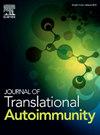Short-chain fatty acids from gut microbiota restore Th17/Treg balance in rheumatoid arthritis: Mechanisms and therapeutic potential
IF 3.6
Q2 IMMUNOLOGY
引用次数: 0
Abstract
Rheumatoid arthritis (RA) is a chronic autoimmune disorder characterized by synovial inflammation and joint destruction. Dysregulation of the Th17/Treg balance is a key immunological hallmark of RA. Emerging evidence highlights the critical role of gut microbiota-derived short-chain fatty acids (SCFAs) in maintaining immune homeostasis. This review systematically elucidates how SCFAs modulate the Th17/Treg equilibrium through three synergistic mechanisms: (1) metabolic reprogramming via AMPK/mTOR signaling, (2) epigenetic regulation by inhibiting HDAC, and (3) modulation of cytokine cascades. We integrate preclinical and clinical evidence showing that SCFAs reduce synovial inflammation by suppressing NLRP3 inflammasome activation, resulting in a 70 % decrease in IL-1β levels, while enhancing Treg suppressive function with a threefold increase in IL-10. Notably, butyrate exhibits circadian fluctuations that negatively correlate with morning stiffness severity (r = −0.82, p < 0.01), suggesting novel chronotherapeutic opportunities. Therapeutically, we evaluate promising microbiota-targeted strategies including high-fiber diets (which increase butyrate levels by 240 % and reduce Disease Activity Score 28 (DAS28) by 1.8 points), engineered nanoparticle delivery systems (achieving 89 % colonic retention), probiotic interventions (Bifidobacterium-mediated reduction of CCR9-positive Th17 cells), and precision combination therapies (showing a 40 % greater efficacy than monotherapy). Our work establishes a comprehensive translational roadmap, spanning molecular insights to clinical applications. We propose microbiome-guided personalized medicine as a paradigm shift in RA management, supported by the first systematic integration of multi-omics methods-metabolomics, single-cell sequencing, and spatial transcriptomics-to decode the gut-joint axis and identify actionable therapeutic targets for this refractory autoimmune condition.
来自肠道菌群的短链脂肪酸恢复类风湿关节炎Th17/Treg平衡:机制和治疗潜力
类风湿性关节炎(RA)是一种以滑膜炎症和关节破坏为特征的慢性自身免疫性疾病。Th17/Treg平衡失调是RA的关键免疫学标志。新出现的证据强调了肠道微生物来源的短链脂肪酸(SCFAs)在维持免疫稳态中的关键作用。本综述系统阐述了SCFAs如何通过三种协同机制调节Th17/Treg平衡:(1)通过AMPK/mTOR信号通路进行代谢重编程,(2)通过抑制HDAC进行表观遗传调控,以及(3)调节细胞因子级联反应。我们综合临床前和临床证据表明,SCFAs通过抑制NLRP3炎性体激活来减少滑膜炎症,导致IL-1β水平降低70%,同时通过将IL-10增加三倍来增强Treg抑制功能。值得注意的是,丁酸盐表现出昼夜节律波动与晨僵严重程度负相关(r = - 0.82, p < 0.01),这表明有新的时间治疗机会。在治疗方面,我们评估了有希望的针对微生物群的策略,包括高纤维饮食(将丁酸盐水平提高240%,将疾病活动评分28 (DAS28)降低1.8分),工程纳米颗粒递送系统(实现89%的结肠保留),益生菌干预(双歧杆菌介导的ccr9阳性Th17细胞减少),以及精确的联合治疗(显示比单一治疗效率高40%)。我们的工作建立了一个全面的转化路线图,跨越分子的见解到临床应用。我们提出以微生物组为指导的个体化医学作为RA管理的范式转变,在多组学方法(代谢组学、单细胞测序和空间转录组学)的首次系统整合的支持下,解码肠道关节轴并确定这种难治性自身免疫性疾病的可行治疗靶点。
本文章由计算机程序翻译,如有差异,请以英文原文为准。
求助全文
约1分钟内获得全文
求助全文
来源期刊

Journal of Translational Autoimmunity
Medicine-Immunology and Allergy
CiteScore
7.80
自引率
2.60%
发文量
33
审稿时长
55 days
 求助内容:
求助内容: 应助结果提醒方式:
应助结果提醒方式:


